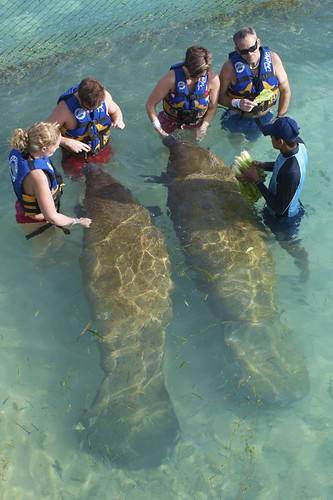

Manatees are endangered because injuries from boat propellers cause cuts which lead to fatal infections. Florida legislators are considering laws to educate boaters about speed reduction and other measures which might help manatees.
Full Text :COPYRIGHT Sea Frontiers Inc. 1994
When I arrived backstage at the Miami Seaquarium, the huge pool was nearly drained. At the bottom of it, surrounded by perky young attendants who were conversing in Spanish, rested a very large manatee, now nearly out of water and none too perky. I had never before seen a manatee at any distance, and this one ten feet below me in the pool just missed the charms that such beasts held in my imagination. "But she's very sick," responded Greg Bossart, the Seaquarium's veterinarian.
On that day four years ago, I was allowed to get closer to some manatee medicine than I was prepared for. The animal with sick skin and very sick lungs had been delivered to the marine theme park next door to the University of Miami's marine facilities. The Seaquarium has a permit to care for sick marine mammals, and Bossart was on hand when the manatee arrived.
He invited me down into the tank after him. He handed me a bucket of iodine to hold once I was there. The staff handlers kept a spray of seawater directed at the mammal as we walked along dousing its wounds, injuries from sad encounters with powerboat propellers. Manatees love company and apparently commotion. They are actually attracted to the watery doings of people, and that's their downfall. Dr. Bossart's beast had big, open gashes. The gashes had allowed in other infections, and the manatee also was suffering from pneumonia. The good doctor treated the lung problems with huge doses of antibiotics. "Basically, we modify the human medicine chest to treat marine mammals. It's mostly guesswork," he said then. To the surprise of the doctor, this manatee recovered and has been returned to the water.
During the last four years, I've seen a good many more manatees, both close up and at a distance. And I've seen plenty in photographs and videos. They all have at least one thing in common. Beyond their infancies, the manatees of North America bear propeller scars. These none-too-dainty floaters, these generous, malleable creatures who twirl themselves tipsy for human videographers, show us a back marked by boating. The manatees' days seem to be numbered in the United States, and mostly as a result, say researchers, of collisions with boaters.
The state of Florida, home to almost 700,000 boats, asked counties whose waters hold manatees to come up with plans to protect them from boating accidents. Dade County, which registered 43,000 boats last year, recently has reduced its speed limits in many areas and restricted some waterways from any use by boats and jet skis, at least during the high season. Most importantly, if manatees are to have any future in these waters, Dade County has increased the number of No Wake Zones--especially in the intercoastal waterway, a preferred haunt of the threatened mammals. These zones and other speed limitations represent Dade County's response to a problem that will be handled differently by other counties up and down our coasts.
The state government has had even more startling ideas recently--meant to keep boaters in check. One notion that reached the legislature as a bill, but never came out of committee, suggested that those who drive boats ought to get licensed. Proponents wanted to test and license boaters just as drivers are licensed. Some version of this bill has been sponsored several times in Tallahassee, and each time it has been contested by boat owners--and failed to pass.
Now some of our legislators are asking their colleagues to consider another bill that would limit the freedoms of boaters. But this bill is gaining wide support, and some in the marine industries feel it may pass this year. The bill suggests that boaters get some education before they get onto the water. Classes, already being taught by the Power Squadron and the Coast Guard Auxiliary, would have to be greatly expanded to meet the needs of the state with the third-largest number of boats in America, but many people feel this would work. And it would require very little government expansion. Students who pass the course would get certificates from their course organizers. They would mail the certificate to a state office and get a card to carry in their wallets. The Florida Marine Patrol would check boaters for cards.
If this bill becomes a state law, it would be the first of its kind and might put Florida in a new light--one that shines on manatees.
Source Citation
Gordon, Bonnie Bilyeu. "The boating wars." Sea Frontiers 40.2 (1994): 5. General OneFile. Web. 7 June 2010.
Document URL
http://find.galegroup.com/gps/infomark.do?&contentSet=IAC-Documents&type=retrieve&tabID=T002&prodId=IPS&docId=A14932102&source=gale&srcprod=ITOF&userGroupName=18551_mcpls&version=1.0
Gale Document Number:A14932102



No comments:
Post a Comment